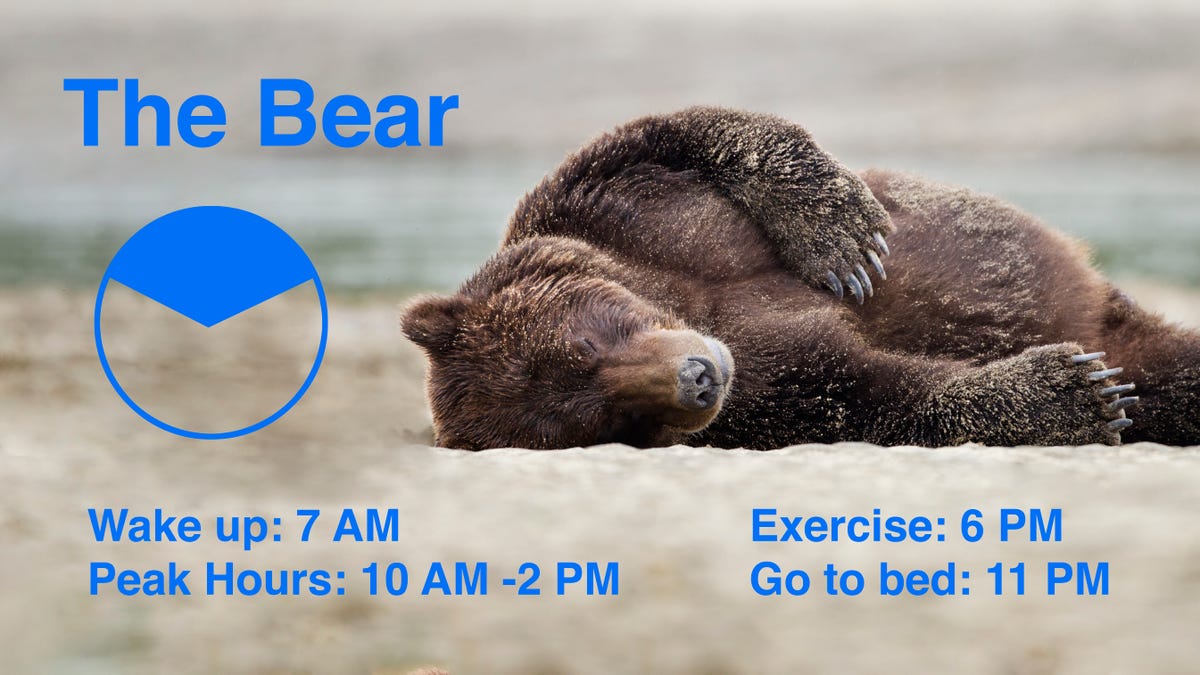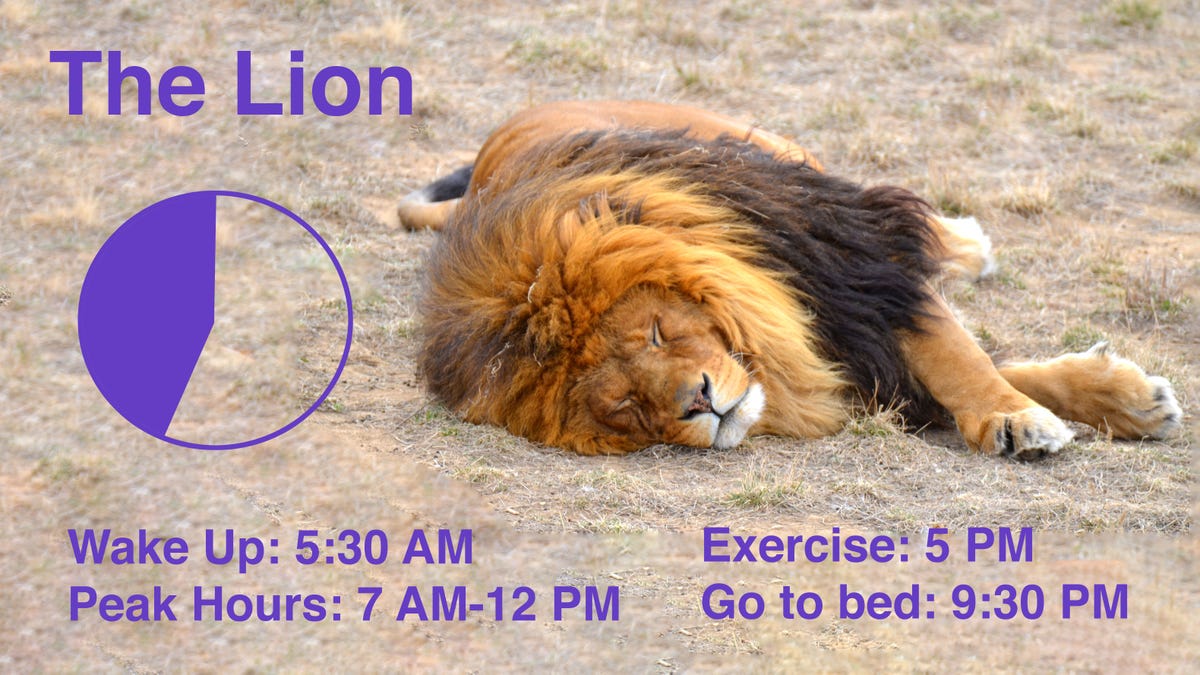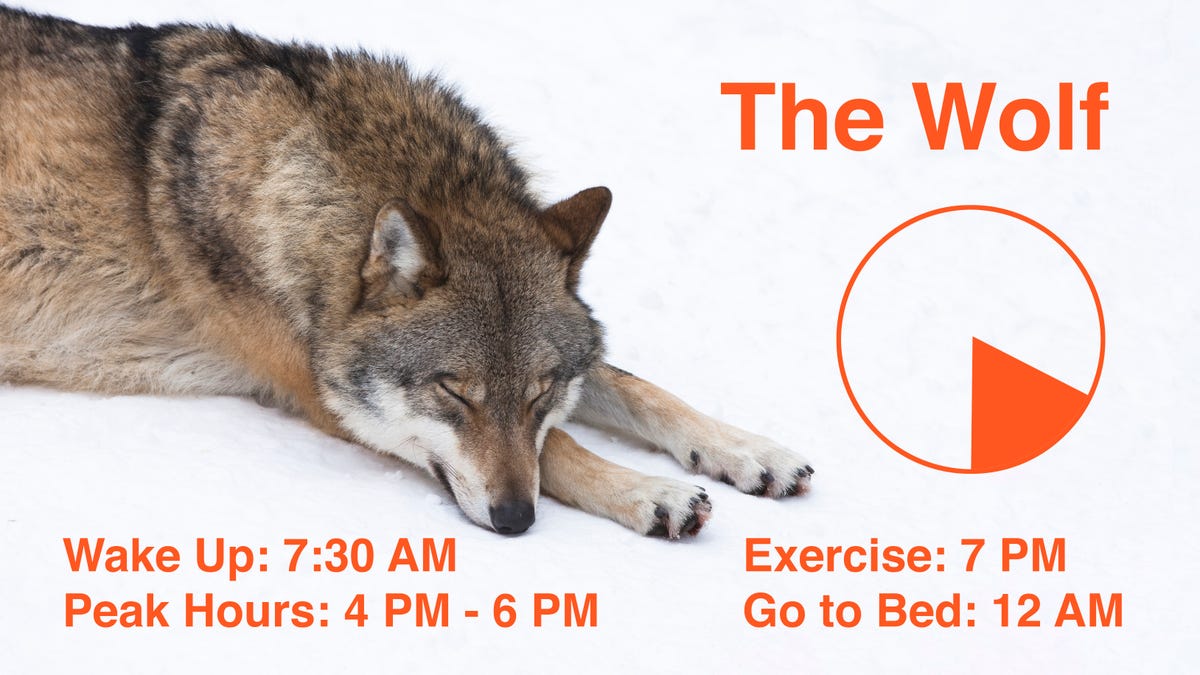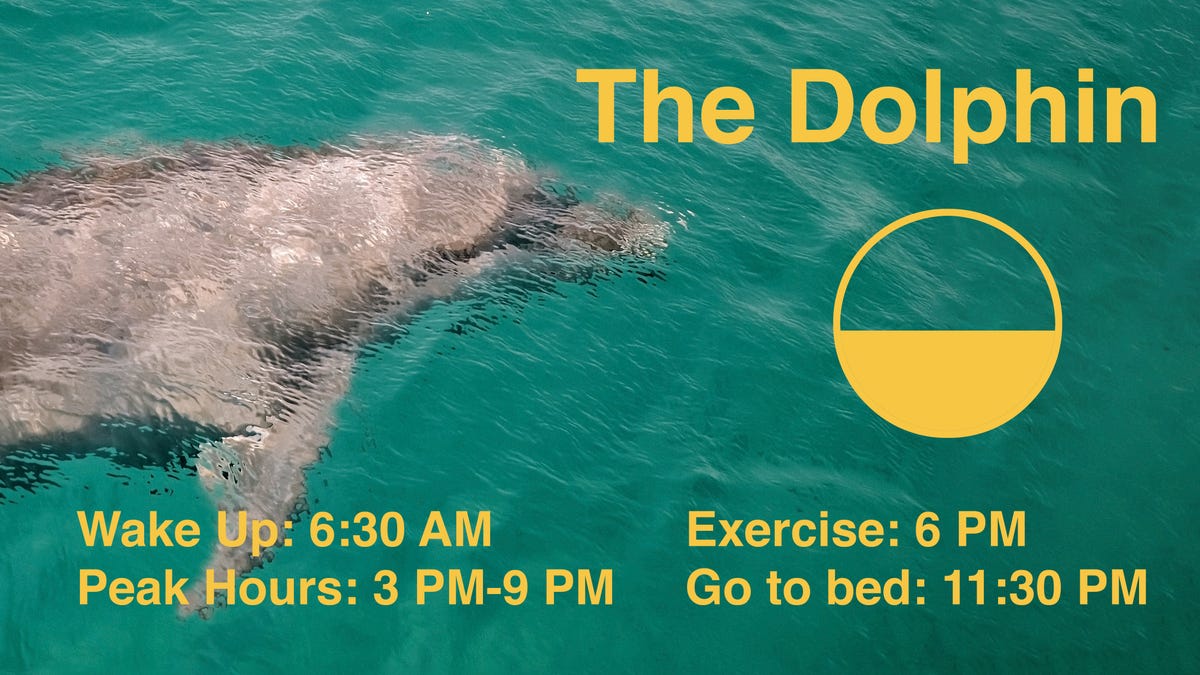From cnet.com
Getting in tune with your body's natural sleep-wake cycle is key for optimal productivity
If you've made your way to this article, chances are you're looking for remedies to sleep better. You've tried melatonin, spicing up your night-time routine and even waking up early in hopes of getting rid of your insomnia. But, what if your body naturally prefers a different daily schedule? This happens because everyone is programmed to function better during different peak hours.
People fall into different groups known as chronotypes based on their body's natural preference for the morning or evening. Chronotypes are categorized into four groups: bear, dolphin, lion and wolf. The names of these groups are all related to the animal's natural sleep-wake cycle. Knowing your chronotype could lead to better sleep. Here's what we know.
What is a chronotype?

Your chronotype dictates when your body naturally feels like falling asleep and waking up during the day. This may sound familiar, and some may even refer to this as circadian rhythm -- a term for the body's internal clock. So you might be wondering, are they the same? Simply put, not quite.
Think of your circadian rhythm as your physiological 24-hour cycle, while your chronotype is your natural, or preferred, biological behaviour during those 24 hours -- like sleeping, eating and productivity levels at certain times of the day.
Research shows that your chronotype determines your peak cognitive and physical performance during the day. Understanding your internal clock can help you optimise your daily schedule and activities to use your time more efficiently and even boost productivity.
The four animal chronotypes
We've all heard the terms "early bird" and "night owl." Well, there's some truth to that. The four chronotype groups -- bear, dolphin, lion and wolf -- are all connected to that animal's sleep-wake cycle, and can shed light on human behaviour, too.
We'll dive into the common traits and ideal schedule for each to help you maximize your productivity and help you catch those zzzs. The following descriptions for each chronotype are based on bestselling author and board-certified sleep specialist Dr. Michael Breus' book, The Power of When.
The Bear Chronotype

People with this chronotype follow the rise and fall of the sun. Bears spend most of their day awake and sit pretty much in the middle in terms of sleep-wake schedules. As for productivity, bears are most productive during the late morning and early afternoon.
If you're reading this, chances are good that you fall into this chronotype. According to Dr. Breus, roughly 50% of the adult population falls under the bear chronotype. It's easy to see how this group dominates our social schedules when they account for over half of the population.
The Lion Chronotype

The lion chronotype is the definition of "early bird" -- lions feel their best when they wake up early in the morning and finish their to-do list before noon. The lion chronotype wakes up with a lot of energy. You know, that one person that is suspiciously happy at 6 a.m.? Yep, probably a lion. If you fall into this group, it's best to schedule important meetings or activities before noon. Even though lions spend most of the early day with lots of energy, they often feel exhausted and find it hard to concentrate by the afternoon. Around 15% to 20% of people identify with this chronotype.
The Wolf Chronotype

If you consider yourself a "night owl" and get those spikes of energy after everyone else is winding down, you're probably the wolf chronotype. Like an actual wolf, this chronotype is known for getting most of their activities done late during the day. Wolves like to stay up late at night and struggle to wake up early. For this very reason, the wolf has a hard time adhering to a typical nine-to-five work schedule. The wolf's productivity peaks from 12 p.m. to 4 p.m. and spikes again at around 6 p.m. Around 15% to 20% of the population falls into this chronotype.
The Dolphin Chronotype

If you have a hard time falling asleep, waking up or following a structured sleep schedule, you most likely have the dolphin chronotype. Of all the chronotypes, this is the rarest -- around 10% of the population identifies with the dolphin chronotype. Dolphins often have a hard time staying asleep because they tend to be very sensitive to external factors like noise and light and are likely to be diagnosed with insomnia. These people also frequently sleep less than the recommended eight hours. The good news is that they have a wide productivity window. Dolphins feel the most productive between 3 p.m. and 9 p.m.
What is my chronotype?
According to one study, chronotype is influenced by many factors like age, sex, environment and even genetics. The same study found that "women were on average earlier chronotypes than men until the age of 40 but later types thereafter." Teens tend to identify with later chronotypes, while adults are likely to switch to an earlier chronotype with age.
The easiest way to find out what's your chronotype is to take a chronotype quiz:
How to work with your chronotype for better sleep and productivity
Not everyone runs on the same "biological time." Therefore, many of our school or work schedules are not in sync with our chronotype. This can cause a misalignment between our internal clock and sleep-wake schedule, especially on weekdays. Research shows that "social jetlag," or switching schedules between the school or work day and the weekend, may negatively impact your health, as it's linked to metabolic disorders, obesity, diabetes and even cardiovascular diseases.
Understanding your chronotype can be a game-changer for getting better sleep and boosting productivity. Knowing what time your body naturally feels more energized can help you organize your daily schedule around your peak hours.
Below is a list of the ideal daily schedules for each chronotype according to Dr. Breus.
Ideal daily schedule for bears:
Ideal daily schedule for lions:
Ideal daily schedule for wolves:
Ideal daily schedule for dolphins:
Too long, didn't read
Your chronotype can tell you a lot about your body's natural sleep-wake cycle. However, even though these types can give you an idea of your ideal schedule, they may vary from one person to another or even change throughout the same person's life. Whether you are a bear, lion, wolf or dolphin, understanding your chronotype can help you maximise productivity, catch a good night's sleep and even improve your overall quality of life.
The information contained in this article is for educational and informational purposes only and is not intended as health or medical advice. Always consult a physician or other qualified health provider regarding any questions you may have about a medical condition or health objectives.
https://www.cnet.com/health/sleep/link-between-sleep-and-productivity/
No comments:
Post a Comment